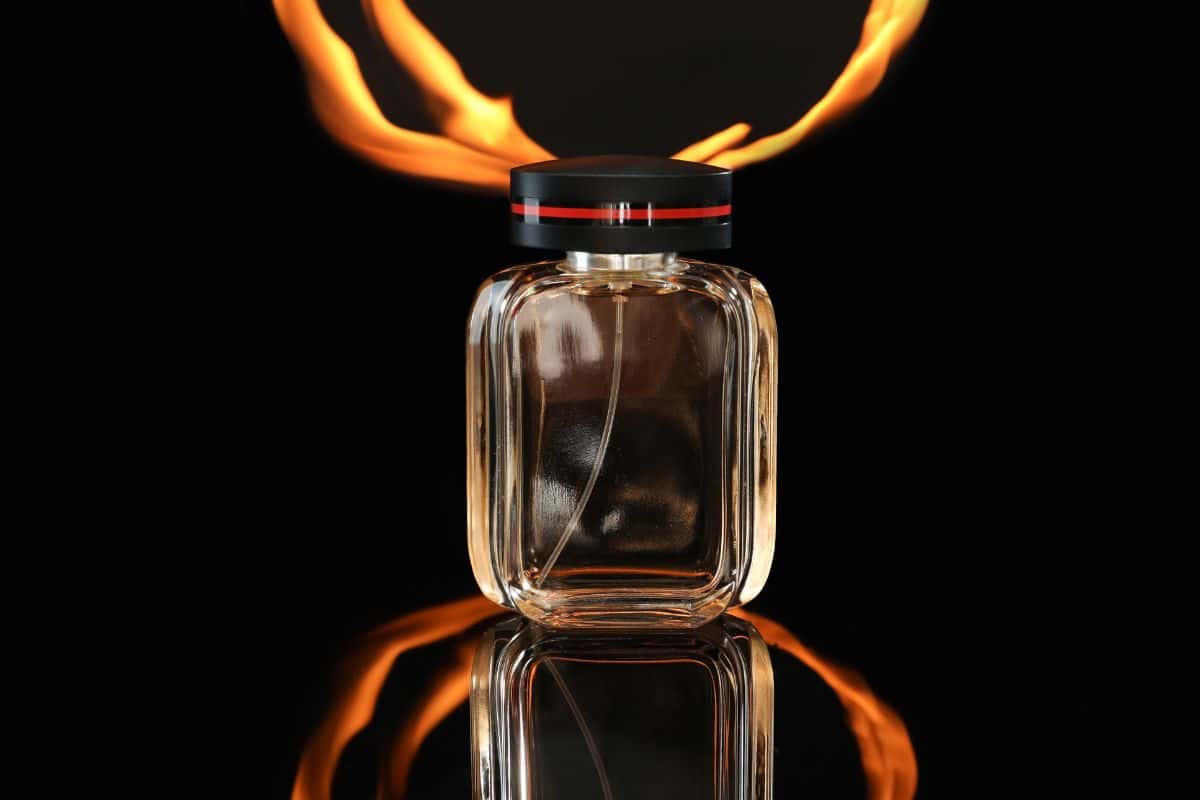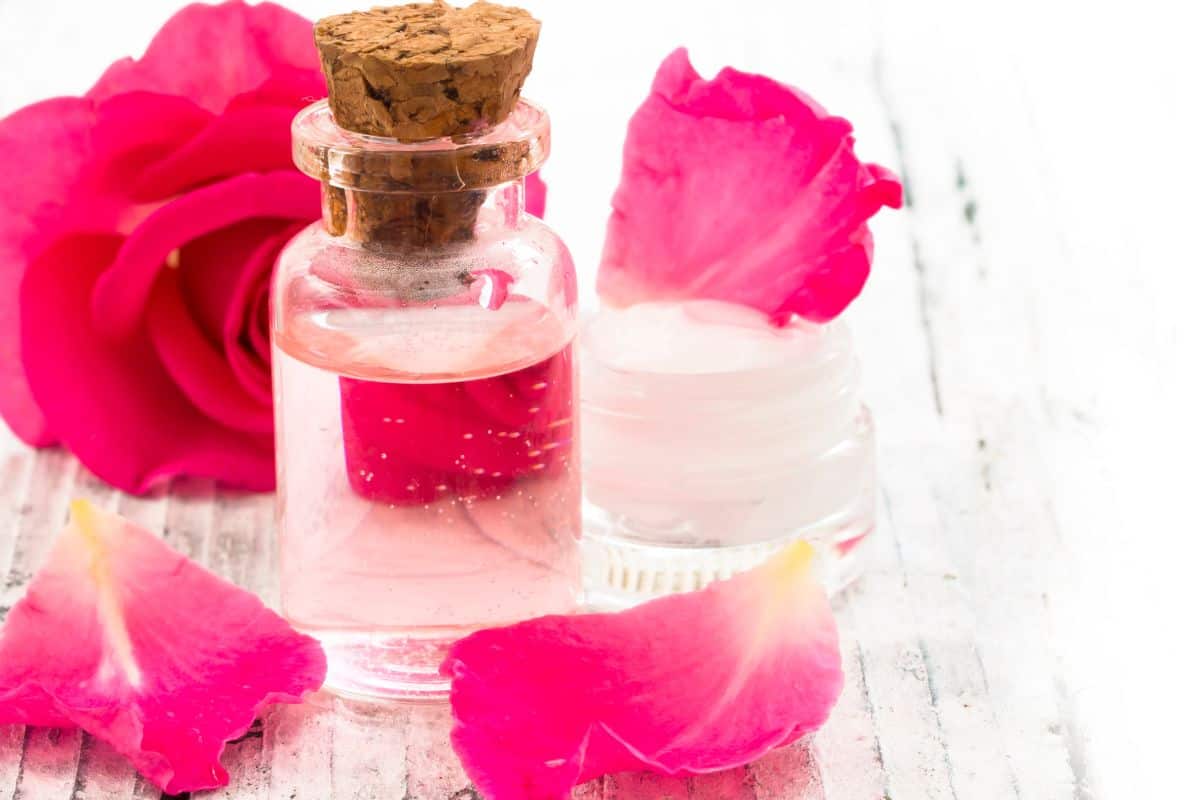Picture this: you’re getting ready for a night out, and as you spritz on your favorite perfume, a terrifying thought crosses your mind—could this delightful-smelling potion turn me into a human torch?
Fear not, my fragrance-loving friends, for we’re here to delve into the burning question (pun intended) of whether perfume is flammable.
So sit back, relax, and let’s ignite your curiosity. (OK, that’s enough of the flaming puns…)

The Science Behind Perfume Flammability
Before we tackle the flammable nature of perfumes, it’s important to understand what makes up these lovely concoctions.
Perfumes and colognes are composed of various ingredients, including essential oils for that irresistible scent, alcohol to dissolve and carry the oils, water to dilute the mixture, and fixatives to make sure you smell divine all day long.
Now, let’s unmask the firestarter in this mix: alcohol.
Alcohol is flammable due to its chemical properties. As you might have guessed, the higher the alcohol content, the more flammable the perfume. The concentration of alcohol in perfumes can vary, with some types having as much as 50% alcohol by volume.
Generally, Eau de Parfums have a higher alcohol content than Eau de toilettes, while Eau de Colognes have the least.
Perfume Safety Tips: Keeping the Flames at Bay
Now that we know that alcohol is a potential fire hazard in perfumes, let’s explore some safety tips to make sure your fragrant adventures don’t go up in smoke.
- Avoid open flames and heat sources: This one may seem obvious, but it’s important to stress. When applying perfume, steer clear of open flames like candles, fireplaces, and gas stoves. It’s also a good idea to avoid smoking immediately after spritzing on your scent (we’re picturing flicking an antique Zippo lighter just after doing that “spritz the air and walk into the cloud” thing)
- Store your perfume properly: Keep your precious bottles away from direct sunlight, high temperatures, and humidity. A cool, dark, and dry place like a cupboard or a drawer is ideal. This is mostly about preserving the quality and longevity of your favorite scents, sunlight isn’t going to ignite your perfumes, but you shouldn’t store them anywhere near a direct heat source
- Be mindful of how you apply: When spritzing, ensure you’re not too close to your clothes or body. Holding the bottle about six inches away from your skin or garments should do the trick. This helps prevent the concentrated alcohol in the perfume from causing irritation or burns.

Myth-busting: Perfume Flammability Misconceptions
While we’re on the subject, let’s address some common misconceptions about perfume flammability:
- Perfumes don’t spontaneously combust: Rest easy, your perfume collection isn’t a ticking time bomb. It takes a direct ignition source to set off the alcohol in your perfume, so as long as you’re following the safety tips we mentioned earlier, you’re in the clear.
- Perfume doesn’t usually cause burns: Although some people may experience skin irritation from certain perfumes, this is usually due to an allergic reaction to one or more of the ingredients, not the flammability of the alcohol. If you’re concerned, do a patch test on a small area of skin before going all out with a new fragrance.
Flammable Perfume Alternatives: Keeping It Cool
If the idea of wearing a flammable perfume still leaves you feeling a little uneasy, there are some alternatives to consider.
Non-flammable or low-alcohol perfume options include solid perfumes, oil-based perfumes, and alcohol-free perfumes. Let’s look at the pros and cons of these alternatives:
- Solid perfumes: These wax-based scents come in a compact form, making them perfect for travel or on-the-go touch-ups. However, they may not last as long as their liquid counterparts, and the scent may be subtler.
- Oil-based perfumes: These fragrances use carrier oils instead of alcohol and can be incredibly long-lasting. However, they may feel heavier or greasier on the skin and might not project as well as alcohol-based perfumes.
- Alcohol-free perfumes: These options typically use water or glycerin as a base, making them gentler on the skin and less flammable. However, they may not have the same staying power or sillage as traditional perfumes.
The Final Sniff: Is Perfume Flammable?
So yes, perfumes can indeed be flammable, primarily due to their alcohol content. However, the risk is very tiny and by understanding the science behind perfume flammability and following safety tips, you can minimize the risks and continue to enjoy your favorite scents without worry.
Before You Go …
So we’ve covered the main question of flammability, but another question we get asked a lot is whether colognes and perfumes are allowed on aircraft. After all, if it’s technically a flammable liquid, is it on the banned list? Find out in our next article!
Can You Bring Cologne On a Plane?
Related Posts
- What Are The Different Perfume Strengths?
- What Ingredient Makes Perfume Last Longer?
- How To Safely Dispose of Perfume
Bonus Video!
All product names, logos, brands, and trademarks are the property of their respective owners
